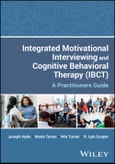Integrated Motivational Interviewing and Cognitive Behavioral Therapy (ICBT) for Adults is a guide for practitioners looking for evidence-based clinical interventions that are portable across settings and diagnoses. Written in plain English and with an emphasis on step-by-step instructions, this valuable toolkit collects strategies and interventions that have been shown to be effective in substance use disorder, depression, anxiety, and beyond. This widely applicable treatment approach draws on motivational interviewing, cognitive behavioral therapy (CBT), motivational enhancement therapy, mindfulness, functional analysis, and other methods that are strongly supported in the literature. With content reflecting emerging research findings and evolving social contexts, this book is both timely and firmly rooted in science.
After presenting a set of proven techniques for motivational interviewing and CBT, this book details a 16-session course designed to fit within conventional models of therapeutic practice. Each session covers a cognitive behavioral skill (e.g., assertiveness, handling cravings, suicidality) and builds upon the previous sessions, but they also work as standalone interventions and do not have to be followed in a particular order. The book also offers additional tools to promote intervention quality and clinical supervision. Worksheets, handouts, and other materials are included in photocopiable format, making this a valuable guide in all outpatient mental health settings. - Learn the fundamentals of motivational interviewing, cognitive behavioral therapy, and other evidence-based treatment modalities - Get practical clinical tools, including step-by-step session guides on cognitive behavioral skills relevant to a range of diagnoses - Access self-assessments, clinical supervision tools, and other resources to enhance clinical effectiveness - Incorporate emerging research, changing social contexts, and lessons learned from the COVID-19 pandemic into your practice
Earlier editions of this guide focused on addressing substance use disorders and cooccurring disorders. This edition is applicable to those disorders but reflects that these clinical strategies are transdiagnostic.
Table of Contents
Figures and Tables vii
Acknowledgements viii
Introduction 1
To Students and Fellow Practitioners 1
Key References Include 1
The Following Features Help Make this Guide Practical 2
The Guide is Organized Into Three Main Sections 2
1 An Overview of Proven Tools and Techniques for Motivational Interviewing/Motivational Enhancement Theory, and Cognitive Behavioral Therapy Treatment 3
Motivational Interviewing and Motivational Enhancement Therapy 3
Motivational Interviewing and the Process of Change 5
The Two Phases of Motivational Interviewing 6
Cognitive Behavioral Therapy 14
Treating Co-occurring Disorders 18
Recovery Supports 20
Patient Activation Within the Context of ICBT 20
On Spirituality 20
Enhancing Cultural Relevance in Clinical Practice 22
2 Clinician Guidance for 16 Sessions of Integrated Cognitive Behavioral Therapy 28
Introduction 28
Law of Thirds 29
Review of Progress and Between-session Challenges 33
Session 1. Eliciting The Life Movie 36
Session 2. Enhancing Situational Awareness 55
Session 3. Learning Assertiveness 69
Session 4. Supporting Recovery Through Enhanced Social Supports 85
Session 5. Supporting Recovery Through Healthy Replacement Activities 97
Session 6. Problem Solving 107
Session 7. Handling Urges, Cravings, and Discomfort 120
Session 8. Working with Thoughts: Part 1 139
Session 9. Working with Emotions 154
Session 10. Making Important Life Decisions 172
Session 11. Enhancing Self-awareness of Substance Use 191
Session 12. Using Mindfulness, Meditation, and Stepping Back 208
Session 13. Addressing Suicidality 220
Session 14. Using Medication in Support of Treatment and Recovery 229
Session 15. Engaging with Self-help 244
Session 16. Using an MI/CBT Approach for Traumatic Stress and Substance Use 252
3 Techniques and Tools Supporting Fidelity of Implementation and Clinical Supervision 279
Introduction 279
Acronyms 280
Adherence Tools and Techniques: Checklists 281
Clinical Supervision Techniques to Improve Adherence 282
ICBT Clinician Checklist Protocol 283
References 290
Index 297








